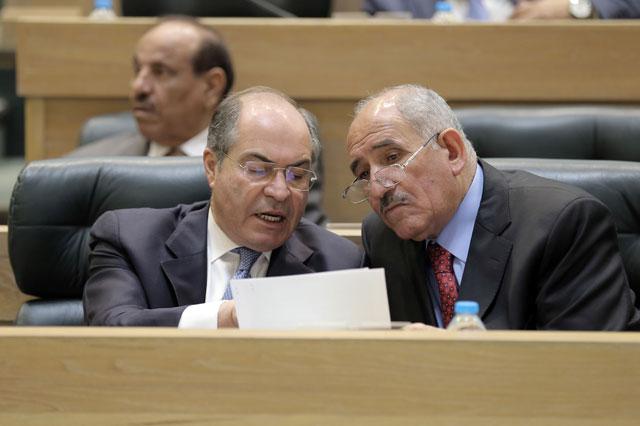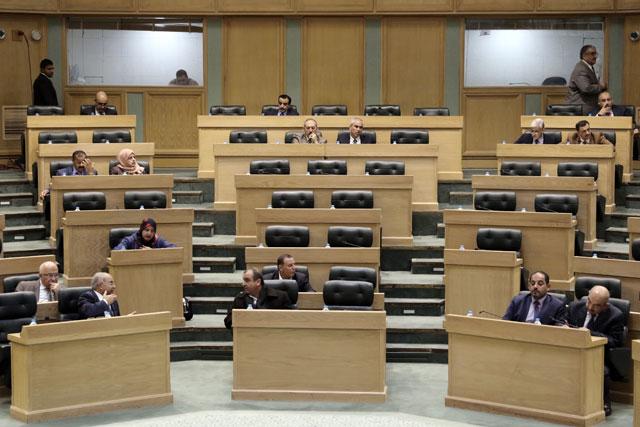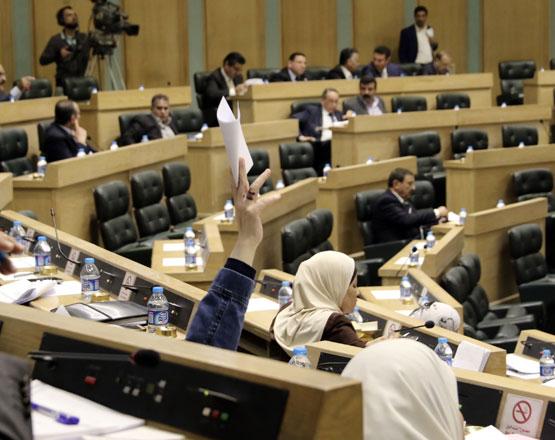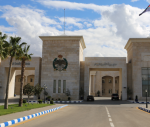You are here
Deputies criticise Israel gas deal, changes to school curricula
By JT - Nov 22,2016 - Last updated at Nov 22,2016

Prime Minister Hani Mulki speaks to Deputy Prime Minister for Services and Minister of Education Mohammad Thneibat during a Lower House session on Tuesday (Photo by Osama Aqarbeh)
AMMAN — The Lower House on Tuesday continued discussions of the government’s policy statement, which Prime Minister Hani Mulki delivered last week, focusing on issues facing Jordan’s sectors and touching on various matters of public interest.
During Monday’s session, lawmakers focused mainly on issues related to the economy and combating corruption, while on Tuesday they discussed the gas agreement signed with Noble Energy, a Houston-based company that holds the largest share in the Israeli Leviathan gas field.
The deputies also voiced demands to address pressing issues at their constituencies and discussed issues of interest to the public, including the changes to school curricula, the Jordan News Agency, Petra, reported.
MP Ibrahim Bani Hani (Irbid, 1st District) called for improving the healthcare sector through the fair distribution of services.
He also highlighted the importance of training general practitioners of medicine for three years as specialists before having them work at primary and comprehensive healthcare centres.
Bani Hani called for enhancing the agriculture and transport sectors, in addition to reconsidering the “gas agreement with the Zionist entity”.
The Lower House of Parliament approved a peace deal between Jordan and Israel in November 1994. The Kingdom has been engaged in trade relations with Tel Aviv since the deal was signed.
Deputy Abdullah Obeidat (Irbid, 2nd District) voiced rejection of any kind of cooperation with the “Israeli occupation”, especially the gas agreement and also rejected changing school curricula, warning against the threats against young people because of poverty, unemployment and drugs.
The changes have come under attack by some parents and education experts who perceived them as a way to “alienate students from their Islamic values”, while others deemed them as “necessary” and a “step forward”.
A panel formed by the Education Ministry has issued its recommendations on the textbooks, and the ministry said it is committed to implementing them.
For his part, Karak MP Haitham Zayadeen called for instilling the national identity among young people.
He stressed that the prime minister in Jordan is not only an employee but also a “project and a national identity”.
The lawmaker added that Jordan should safeguard its identity as the world is shifting away from globalisation towards the extreme right.
Deputy Dima Tahboub (Amman, 3rd District) criticised amending the curricula and signing the gas agreement, explaining that the religious identity was “reduced” in the curricula and that the price to import gas from Israel is higher than the global price, which she said means that going forward with this agreement is dangerous.
At the beginning of Tuesday’s session, Lower House Speaker Atef Tarawneh called on the blocs to register at the House’s secretariat as soon as possible, in line with the rules of procedure.
Answering one of the deputies’ demands, Tarawneh said the media is the fourth estate and part of its work is supervising the House, distancing himself from attempts to ban photojournalists from doing their job.
By the end of Tuesday’s session, 58 deputies in 130-strong House had taken the podium.
The Chamber is scheduled to continue its discussions in morning and evening sessions on Wednesday ahead of holding a vote of confidence in the government.
According to the Constitution, the government has to gain the confidence of 50 per cent plus one of the Lower House, which is at least 66 deputies.
Related Articles
AMMAN — The Lower House is scheduled to hold a vote of confidence session on Prime Minister Hani Mulki's government today, Speaker Atef Tara
AMMAN — The Lower House approved the draft environment protection law on Tuesday after an extended discussion during a legislative session,
AMMAN — The Lower House on Tuesday voted to send the draft natural resources law back to its energy committee for further examination.MP Ali


















